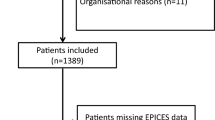Abstract
Objective: To assess the influence of social deprivation on outcome from admission to the intensive care unit. Design: Retrospective cohort study. Setting: Tertiary referral centre mixed adult intensive care unit (ICU). Patients: Seven hundred seventy-four consecutive admissions to the ICU over a 2-year period. Interventions: None.¶Measurements and results: Age, admission illness severity measured by APACHE II score, predicted hospital mortality, actual hospital mortality and length of ICU stay were obtained for all patients. Social deprivation was assessed by Carstairs Score for postcode sector of residence categorised from 1 (most affluent ) to 7 (most deprived). Carstairs Scores were obtained for 716 patients. When patients in categories 6 and 7 were compared with the others there were no significant differences in age, admission illness severity, predicted or actual hospital mortality and length of ICU stay. On multivariate analysis there was no evidence of an increased mortality risk for patients in categories 6 and 7 (p = 0.256, odds ratio 1.2, 95 % confidence interval 0.9–1.7). Conclusions: Social deprivation does not influence outcome in patients admitted to the ICU.
Similar content being viewed by others
Author information
Authors and Affiliations
Additional information
Received: 14 December 1999/Final revision received: 31 March 2000/Accepted: 6 April 2000
Rights and permissions
About this article
Cite this article
Findlay, J., Plenderleith, J. & Schroeder, D. Influence of social deprivation on intensive care outcome. Intensive Care Med 26, 929–933 (2000). https://doi.org/10.1007/s001340051283
Issue Date:
DOI: https://doi.org/10.1007/s001340051283




